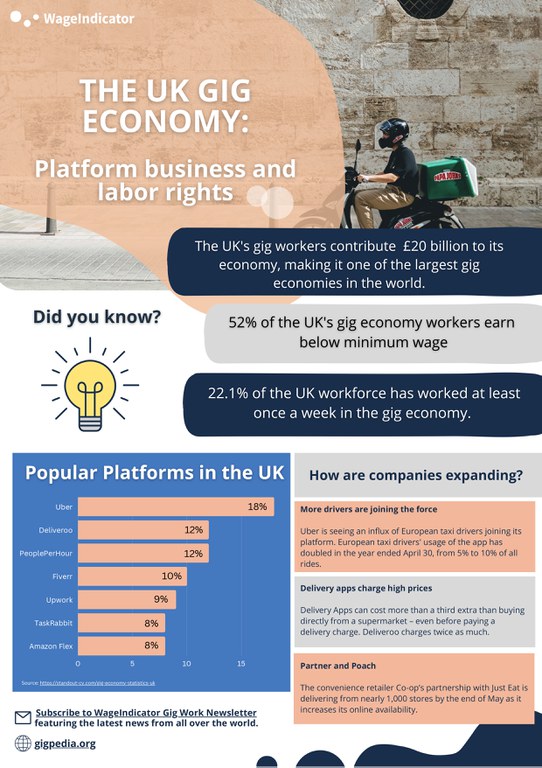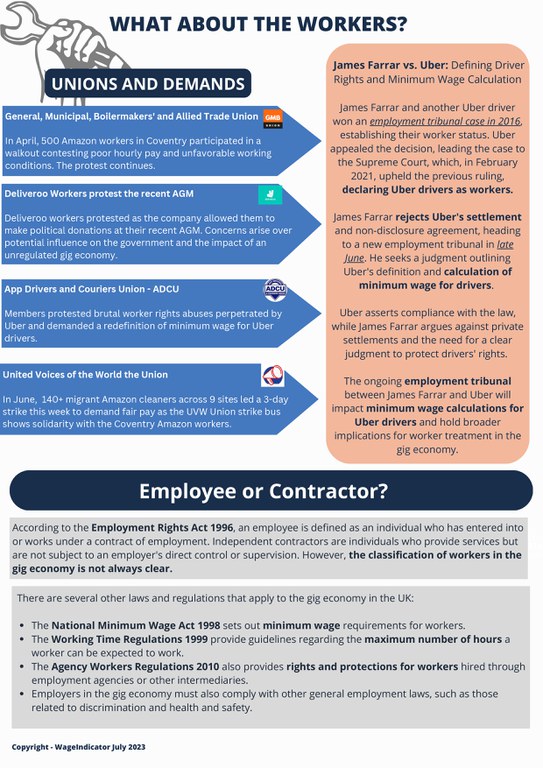TEXT FORMAT
THE UK GIG ECONOMY: Platform business and labor rights
- The UK's gig workers contribute £20 billion to its economy, making it one of the largest gig economies in the world.
- 52% of the UK's gig economy workers earn below minimum wage.
- 22.1% of the UK workforce has worked at least once a week in the gig economy.
Popular Platforms in the UK
- Uber: 18%
- Deliveroo: 12%
- PeoplePerHour: 12%
- Fiverr: 10%
- Upwork: 9%
- TaskRabbit: 8%
- Amazon Flex: 8%
How are companies expanding?
- More drivers are joining the force. Uber is seeing an influx of European taxi drivers joining its platform. European taxi drivers' usage of the app has doubled in the year ended April 30, from 5% to 10% of all ride.
- Delivery apps charge high prices. Delivery Apps can cost more than a third extra than buying directly from a supermarket – even before paying a delivery charge. Deliveroo charges twice as much.
- Partner and Poach. The convenience retailer Co-op’s partnership with Just Eat is delivering from nearly 1,000 stores by the end of May as it increases its online availability.
WHAT ABOUT THE WORKERS?
UNIONS AND DEMANDS
General, Municipal, Boilermakers' and Allied Trade Union
In April, 500 Amazon workers in Coventry participated in a walkout contesting poor hourly pay and unfavorable working conditions. The protest continues.
Deliveroo Workers protest the recent AGM
Deliveroo workers protested as the company allowed them to make political donations at their recent AGM. Concerns arise over potential influence on the government and the impact of an unregulated gig economy.
App Drivers and Couriers Union - ADCU
Members protested brutal worker rights abuses perpetrated by Uber and demanded a redefinition of minimum wage for Uber drivers.
United Voices of the World the Union
In June, 140+ migrant Amazon cleaners across 9 sites led a 3-day strike this week to demand fair pay as the UVW Union strike bus shows solidarity with the Coventry Amazon workers.
James Farrar vs. Uber: Defining Driver Rights and Minimum Wage Calculation
James Farrar and another Uber driver won an employment tribunal case in 2016, establishing their worker status. Uber appealed the decision, leading the case to the Supreme Court, which, in February 2021, upheld the previous ruling, declaring Uber drivers as workers.
James Farrar rejects Uber's settlement and non-disclosure agreement, heading to a new employment tribunal in late June. He seeks a judgment outlining Uber's definition and calculation of minimum wage for drivers.
Uber asserts compliance with the law, while James Farrar argues against private settlements and the need for a clear judgment to protect drivers' rights.
The ongoing employment tribunal between James Farrar and Uber will impact minimum wage calculations for Uber drivers and hold broader implications for worker treatment in the gig economy
.
Employee or Contractor?
According to the Employment Rights Act 1996, an employee is defined as an individual who has entered into or works under a contract of employment. Independent contractors are individuals who provide services but are not subject to an employer's direct control or supervision. However, the classification of workers in the gig economy is not always clear.
There are several other laws and regulations that apply to the gig economy in the UK:
- The National Minimum Wage Act 1998 sets out minimum wage requirements for workers.
- The Working Time Regulations 1999 provide guidelines regarding the maximum number of hours a worker can be expected to work.
- The Agency Workers Regulations 2010 also provides rights and protections for workers hired through employment agencies or other intermediaries.
- Employers in the gig economy must also comply with other general employment laws, such as those related to discrimination and health and safety.
Copyright: WageIndicator - Jul 2023
Subscribe to WageIndicator Gig Work Newsletter featuring the latest news from all over the world


